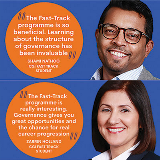*/

Sophie Cashell’s nine top tips to help new pupils make the most of the crucial nine months before it’s tenancy decision time
I successfully completed pupillage in 2021-22 and joined Littleton Chambers as a tenant in October 2022. While perhaps not the same in all chambers, at my set the tenancy decision is in the summer. Therefore, while it is a 12-month pupillage, it is the first nine months which count towards tenancy. Below are nine tips to help you make the most of those nine months.
I do not just mean memorising an employment law handbook from cover to cover (though, that certainly would have assisted me). Pupillage is gruelling, and it is worth starting your pupillage rested and ready for the year ahead. Often when I meet future pupils, they ask what they can do ahead of starting to best prepare themselves, and my answer is always the same: rest before the rollercoaster of pupillage begins.
At my set, you have a different pupil supervisor every three months – you attend their hearings, sit in their room in Chambers, observe their conferences and assist with drafting etc. This is the best hands-on training you can have, and I would encourage every pupil to make the most of it. Ask your supervisors (and any other barrister you shadow) questions, watch how they approach cases, how they interact with lay or professional clients, and even how they engage with colleagues (both senior and junior). That is exactly the purpose of pupillage.
However, I would caution two things. First, absorbing all that information like a sponge is a good use of your training; parroting its contents regardless of the context is not. You need to be able to adapt what you have learnt to the circumstances – is the phrase you want to use relevant or are you simply using it because you previously heard your supervisor say it? Second, you need to be able to modify what you have learnt to suit your own style – it is not a one size fits all model, and how you practise as a barrister will differ to others. Pupillage is not like memorising a textbook so you can regurgitate it in an exam, it is learning the skills and tools required so that you can apply them appropriately when you start on your feet.
Building connections is fundamental to a successful career at the Bar. During pupillage, most of your networking will be internally within chambers. You want to have good relationships with your supervisors and other members of chambers. They are the individuals who will be voting at your tenancy decision, and, hopefully, will be your colleagues in the future. It is much easier to vote ‘yes’ when they know who you are, your work ethic and your ability.
Additionally, you will want to cultivate good relationships with staff members: those in reception and marketing, the (fee) clerks, the Administration or Chambers Director, etc. During pupillage (and thereafter) they can be enormously helpful – whether it is a bundle that needs quickly printing, guidance on chambers admin, or advice on working for a particular barrister, being on good terms with them will prove to be your secret weapon.
A key part of building rapport with people is being visible. I started pupillage just as the world was emerging from the pandemic and that meant that not as many people were in Chambers. Nevertheless, it was important to still be seen in the clerks’ room and to make the effort to talk to all of those who were around. I also went to every event Chambers put on – the silks’ parties, the junior drinks, the Chambers dinner, and all the networking events. Not only did that allow me to introduce myself to those who I had not seen in Chambers, but it also showed my commitment to joining Chambers and being part of the wider team.
While each pupillage is different, we had several centralised assessments as well as being assessed on all work for other members of Chambers. We received scores out of ten and feedback which acted as markers of our ability, and which were scrutinised when it came to the tenancy decision. For any assessments you may have: (1) take time to read and understand your brief; (2) utilise all library resources at your disposal (Lexis, Westlaw and the Inn libraries); (3) ensure you have sufficient time to complete the exercise (which may require a discussion with your supervisor); and (4) incorporate any previous feedback you have received (avoiding making the same mistakes twice).
Pupillage, as stated, is about developing the skills necessary to build your own successful practice. Learning what to do (or not to do) from your supervisors, and those you shadow is instrumental to this. Yet, if you do not write notes on what you have learnt, you may have forgotten it by the time of your next assessment/case. It is therefore a good idea to: (a) make detailed notes of what you observe, including good phrases you have heard; (b) earmark a good piece of drafting to use as a future example; and (c) make crib sheets on how to approach certain hearings or legal problems.
Resilience is key at the Bar, and nothing will teach you that better than enduring pupillage. While constant feedback is great for learning, it can also at times be demoralising. It is therefore essential that you believe in yourself (you were given pupillage for a reason!) and learn from your challenges.
I found my first three months overwhelming – while I had completed the Bar course and had been a paralegal, everything was still new to me. At my first handover it was made crystal clear what I needed to work on and over the course of the next three months I made sure I routinely practised that and had transparent conversations with my supervisors to ensure I was on the right trajectory. You are not expected to be perfect instantly, but you do need to ultimately hit the requisite standard.
Having a good support system during pupillage is crucial. Members of chambers will be kind and supportive, but they are also the ones assessing you. Naturally, as a result, you cannot be as open with them as you would with others. Fortunately, my co-pupil and I got on very well and we could lean on each other when pupillage was getting stressful. I would equally encourage you to see your contemporaries as friends, not foes.
It is important to be yourself, to interact with everyone in chambers and show them your personality. All being well, this will be the place you build a long and prosperous career, and you need to see if it suits you. That being said, it is an assessment and so you should behave professionally. For example: limit your alcohol intake at chambers’ events; make sure you don’t say inappropriate things to those in chambers; and exercise discretion with information that you hear.

I successfully completed pupillage in 2021-22 and joined Littleton Chambers as a tenant in October 2022. While perhaps not the same in all chambers, at my set the tenancy decision is in the summer. Therefore, while it is a 12-month pupillage, it is the first nine months which count towards tenancy. Below are nine tips to help you make the most of those nine months.
I do not just mean memorising an employment law handbook from cover to cover (though, that certainly would have assisted me). Pupillage is gruelling, and it is worth starting your pupillage rested and ready for the year ahead. Often when I meet future pupils, they ask what they can do ahead of starting to best prepare themselves, and my answer is always the same: rest before the rollercoaster of pupillage begins.
At my set, you have a different pupil supervisor every three months – you attend their hearings, sit in their room in Chambers, observe their conferences and assist with drafting etc. This is the best hands-on training you can have, and I would encourage every pupil to make the most of it. Ask your supervisors (and any other barrister you shadow) questions, watch how they approach cases, how they interact with lay or professional clients, and even how they engage with colleagues (both senior and junior). That is exactly the purpose of pupillage.
However, I would caution two things. First, absorbing all that information like a sponge is a good use of your training; parroting its contents regardless of the context is not. You need to be able to adapt what you have learnt to the circumstances – is the phrase you want to use relevant or are you simply using it because you previously heard your supervisor say it? Second, you need to be able to modify what you have learnt to suit your own style – it is not a one size fits all model, and how you practise as a barrister will differ to others. Pupillage is not like memorising a textbook so you can regurgitate it in an exam, it is learning the skills and tools required so that you can apply them appropriately when you start on your feet.
Building connections is fundamental to a successful career at the Bar. During pupillage, most of your networking will be internally within chambers. You want to have good relationships with your supervisors and other members of chambers. They are the individuals who will be voting at your tenancy decision, and, hopefully, will be your colleagues in the future. It is much easier to vote ‘yes’ when they know who you are, your work ethic and your ability.
Additionally, you will want to cultivate good relationships with staff members: those in reception and marketing, the (fee) clerks, the Administration or Chambers Director, etc. During pupillage (and thereafter) they can be enormously helpful – whether it is a bundle that needs quickly printing, guidance on chambers admin, or advice on working for a particular barrister, being on good terms with them will prove to be your secret weapon.
A key part of building rapport with people is being visible. I started pupillage just as the world was emerging from the pandemic and that meant that not as many people were in Chambers. Nevertheless, it was important to still be seen in the clerks’ room and to make the effort to talk to all of those who were around. I also went to every event Chambers put on – the silks’ parties, the junior drinks, the Chambers dinner, and all the networking events. Not only did that allow me to introduce myself to those who I had not seen in Chambers, but it also showed my commitment to joining Chambers and being part of the wider team.
While each pupillage is different, we had several centralised assessments as well as being assessed on all work for other members of Chambers. We received scores out of ten and feedback which acted as markers of our ability, and which were scrutinised when it came to the tenancy decision. For any assessments you may have: (1) take time to read and understand your brief; (2) utilise all library resources at your disposal (Lexis, Westlaw and the Inn libraries); (3) ensure you have sufficient time to complete the exercise (which may require a discussion with your supervisor); and (4) incorporate any previous feedback you have received (avoiding making the same mistakes twice).
Pupillage, as stated, is about developing the skills necessary to build your own successful practice. Learning what to do (or not to do) from your supervisors, and those you shadow is instrumental to this. Yet, if you do not write notes on what you have learnt, you may have forgotten it by the time of your next assessment/case. It is therefore a good idea to: (a) make detailed notes of what you observe, including good phrases you have heard; (b) earmark a good piece of drafting to use as a future example; and (c) make crib sheets on how to approach certain hearings or legal problems.
Resilience is key at the Bar, and nothing will teach you that better than enduring pupillage. While constant feedback is great for learning, it can also at times be demoralising. It is therefore essential that you believe in yourself (you were given pupillage for a reason!) and learn from your challenges.
I found my first three months overwhelming – while I had completed the Bar course and had been a paralegal, everything was still new to me. At my first handover it was made crystal clear what I needed to work on and over the course of the next three months I made sure I routinely practised that and had transparent conversations with my supervisors to ensure I was on the right trajectory. You are not expected to be perfect instantly, but you do need to ultimately hit the requisite standard.
Having a good support system during pupillage is crucial. Members of chambers will be kind and supportive, but they are also the ones assessing you. Naturally, as a result, you cannot be as open with them as you would with others. Fortunately, my co-pupil and I got on very well and we could lean on each other when pupillage was getting stressful. I would equally encourage you to see your contemporaries as friends, not foes.
It is important to be yourself, to interact with everyone in chambers and show them your personality. All being well, this will be the place you build a long and prosperous career, and you need to see if it suits you. That being said, it is an assessment and so you should behave professionally. For example: limit your alcohol intake at chambers’ events; make sure you don’t say inappropriate things to those in chambers; and exercise discretion with information that you hear.
Sophie Cashell’s nine top tips to help new pupils make the most of the crucial nine months before it’s tenancy decision time

No-one should have to live in sub-standard accommodation, says Antony Hodari Solicitors. We are tackling the problem of bad housing with a two-pronged approach and act on behalf of tenants in both the civil and criminal courts

Pupillage offers hit new record exceeding pre-pandemic levels, Bar Council report finds

What’s it like being a Senior Crown Prosecutor? Stuart Page describes what drew him to the role, the skills required, and a typical day in the life

Harry Hodgkin, CEO of The Barrister Group, gives an insight into Chambers' core principles and the individual barrister's experience

Congratulations to the Crown Prosecution Service – a Top 10 Employer for Working Families 2023

With the explosion of interest in governance and the growing need to be multi-skilled to keep career options open, adding an extra string to your bow is not without its merits. The Chartered Governance Institute UK Ireland (CGIUKI) Fast Track for the Chartered Governance Qualifying Programme could be ideal for experienced professionals to reach chartered governance status